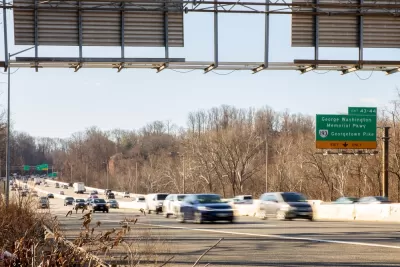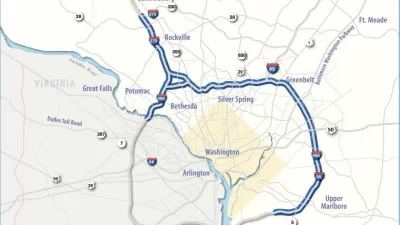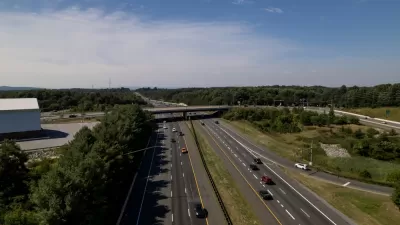In a victory for Governor Larry Hogan, who has championed the project, the Federal Highway Administration is allowing the Beltway expansion project to move ahead.

Maryland Governor Larry Hogan’s controversial $5 billion plan to expand parts of the Beltway and Interstate 270 can move forward after the Federal Highway Administration signed off on the project, reports Ian Duncan in the Washington Post. “Maryland is planning to add two toll lanes to the Beltway in each direction, between the Virginia side of a new and expanded American Legion Bridge and the exit for Old Georgetown Road in Bethesda,” and convert two I-270 lanes to toll lanes. The plan was scaled back in May 2021 in response to strong opposition from some officials and environmental groups.
The project also includes some funding for transit. “The contracting group with which the state intends to partner would provide $300 million for transit in Montgomery County over the life of the project. The state transportation department would build a new facility and provide a fleet of buses, and allocate a further $60 million to design transit projects in the county.”
Nevertheless, transit advocates criticize the project, saying the approval process lacked transparency and “ignored valid concerns from members of the public, and advocates from the environmental and transportation communities.” According to a separate article in Maryland Matters by Danielle E. Gaines, transit advocate Ben Ross cited “possible scientific fraud,” saying that “he found unexplained changes in the traffic models the state used to determine how much time motorists would save by using toll lanes.” The Federal Highway Administration stated they failed to find evidence of any fraud. The project now requires approval of the contract by the state’s Board of Public Works.
FULL STORY: Controversial Hogan plan for Beltway, I-270 toll lanes gets green light

Alabama: Trump Terminates Settlements for Black Communities Harmed By Raw Sewage
Trump deemed the landmark civil rights agreement “illegal DEI and environmental justice policy.”

Study: Maui’s Plan to Convert Vacation Rentals to Long-Term Housing Could Cause Nearly $1 Billion Economic Loss
The plan would reduce visitor accommodation by 25% resulting in 1,900 jobs lost.

Planetizen Federal Action Tracker
A weekly monitor of how Trump’s orders and actions are impacting planners and planning in America.

Waymo Gets Permission to Map SF’s Market Street
If allowed to operate on the traffic-restricted street, Waymo’s autonomous taxis would have a leg up over ride-hailing competitors — and counter the city’s efforts to grow bike and pedestrian on the thoroughfare.

Parklet Symposium Highlights the Success of Shared Spaces
Parklets got a boost during the Covid-19 pandemic, when the concept was translated to outdoor dining programs that offered restaurants a lifeline during the shutdown.

Federal Homelessness Agency Places Entire Staff on Leave
The U.S. Interagency Council on Homelessness is the only federal agency dedicated to preventing and ending homelessness.
Urban Design for Planners 1: Software Tools
This six-course series explores essential urban design concepts using open source software and equips planners with the tools they need to participate fully in the urban design process.
Planning for Universal Design
Learn the tools for implementing Universal Design in planning regulations.
Caltrans
Smith Gee Studio
Institute for Housing and Urban Development Studies (IHS)
City of Grandview
Harvard GSD Executive Education
Toledo-Lucas County Plan Commissions
Salt Lake City
NYU Wagner Graduate School of Public Service





























